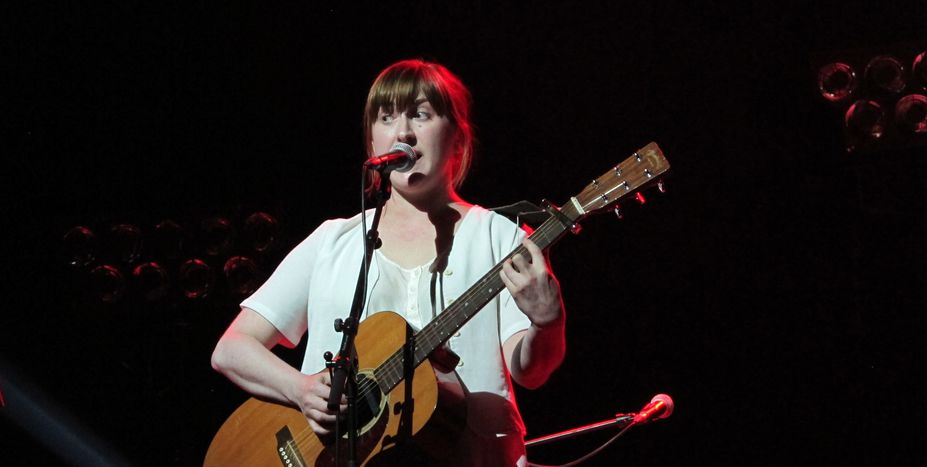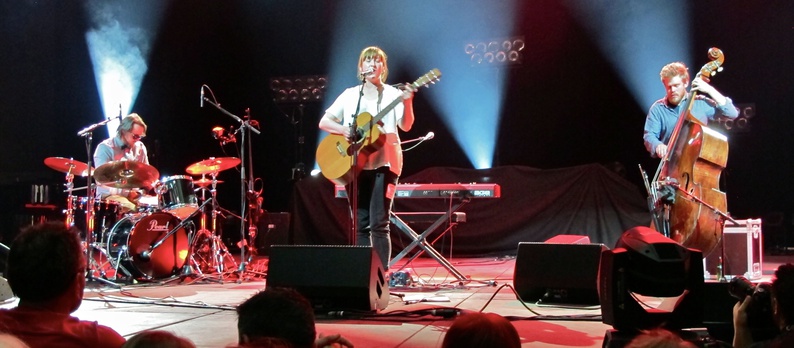
Liz Green, the Singer that Wanted to Lead a Normal Life
Published on
Translation by:
Samantha KelloggDuring the latest edition of the Europavox festival, I had the opportunity to talk with the singer Liz Green, and what at first I predicted would be a calm chat full of good cheer ended up becoming the most depressing interview of my life. I present to you, Liz Green, the talented and innovative singer-songwriter from Manchester that only wanted to live life like a normal person.
 I find myself with the British singer-songwriter Liz Green shortly after her concert at Europavox Festival in Clermont-Ferrand (France). The singer from Manchester just gave an interview and I realise that she seems tired to the naked eye. She just stopped playing an hour and a half ago and there have been several of us journalists that have waited to be able to talk to her. She hasn't even changed her clothes. I suspect that she wants to go to her hotel and relax a little, but work is work. I'm not an expert in music culture (not by a long shot), nor could I imagine that carrying out an interview with a folk singer would end up being so complicated. After all, Liz has a great sense of humour. I spoke with my festival colleagues (the majority being journalists specialised in music) to get some advice and I finally decided that I would carry out a normal interview, trying not to meddle in any touchy subjects, to provide Cafébabel readers the chance to get to know this English promise a little better. The musical career of Green, who used to work at a bookstore, took off in 2007 when she won a musical competition in Glastonbury. From then on, the artist from Manchester was making herself more and more well known, but it wasn't until 2011 when she released her debut album, “O, devotion!” that she crossed the threshold. Now, four years later, she just released her second album, Haul away!, where we again find that mix of jazz, soul, folk and indie that defines her. I decide to break the ice, asking her about her latest record (artists tend to really like promoting themselves) in order to, little by little, win her over. Seriously, from miles away I can tell that she doesn't feel like giving this interview...
I find myself with the British singer-songwriter Liz Green shortly after her concert at Europavox Festival in Clermont-Ferrand (France). The singer from Manchester just gave an interview and I realise that she seems tired to the naked eye. She just stopped playing an hour and a half ago and there have been several of us journalists that have waited to be able to talk to her. She hasn't even changed her clothes. I suspect that she wants to go to her hotel and relax a little, but work is work. I'm not an expert in music culture (not by a long shot), nor could I imagine that carrying out an interview with a folk singer would end up being so complicated. After all, Liz has a great sense of humour. I spoke with my festival colleagues (the majority being journalists specialised in music) to get some advice and I finally decided that I would carry out a normal interview, trying not to meddle in any touchy subjects, to provide Cafébabel readers the chance to get to know this English promise a little better. The musical career of Green, who used to work at a bookstore, took off in 2007 when she won a musical competition in Glastonbury. From then on, the artist from Manchester was making herself more and more well known, but it wasn't until 2011 when she released her debut album, “O, devotion!” that she crossed the threshold. Now, four years later, she just released her second album, Haul away!, where we again find that mix of jazz, soul, folk and indie that defines her. I decide to break the ice, asking her about her latest record (artists tend to really like promoting themselves) in order to, little by little, win her over. Seriously, from miles away I can tell that she doesn't feel like giving this interview...
Cafébabel (CB): What surprises, what change, can we find in this new album?
Liz Green (LG): What can we find that's new? Well, it's basically the same as the previous record, but with more piano... That and the flow. That's more or less the only difference. Yeah.
Very well. It's not what I expected, but fine. I keep at her, but there's nothing else. No other differences. In fact, the first record worked pretty well, so why wouldn't she make the second one similar? However, Liz's demeanor isn't entirely optimistic, so I decide to leave this topic for later and ask the typical question that no musical interview can be without.
CB: Your personality seems pretty eclectic: a mix of jazz, soul...it transports us back in time to a bygone era. Who inspires you, who are your influences?
LG: I don't know, I really don't know. I just try to listen to a lot of different people and read a lot of different books and then I have the... I don't know. It's like a big ball. And then, I start to write songs and there's always someone who says: “Oh! This comes from... Or from... “. But I truly don't know, it probably comes from one of the books that I've read or from one of the records I've heard. From wherever. In either case, it's the product of a big cerebral ball. There's not any specific influence, it just so happens that I sound like a lot of things.
CB: But what type of music do you listen to? (I decide to insist and not give in).
LG: I mostly listen to my friend's music, a band from Manchester that I used to play with. I like the melodies they make, a mix of different styles like soul and Irish music, jazz and blues... They really influence me a lot. So, it's like a mix of soul, classical music, jazz... yeah.
CB: In your songs we find subjects as varied as winter, silence and even a funeral. Nearly all of them refer to a feeling of nostalgia and melancholy. How do you choose your subjects?
LG: It involves a lot of words (she laughs). Actually, I don't choose anything, to be honest, and maybe this is making me sound like a jerk, but I only make up stories because people want to know what the stories behind my songs are. I really don't plan anything, you could probably think up anything and that could mean something in some song. The truth is the interpretations that people make up about my songs don't worry me. People who listen to my song and say “oh, yeah, I think that this is talking about Liz and then, oh yeah!”. Well look, I don't know if that's the conversation... maybe. Why not? But, honestly, I don't know what interpretation to make up. However, I'm used to writing depressing stories because I believe that a story isn't good if it has a happy ending. It's not a good story; there has to be something unhappy.
CB: And how long can it take you to write about a subject?
LG: Every subject is different.
 CB: Do you have a special place to write?
CB: Do you have a special place to write?
LG – I live in a room in a shared house, that's where I write the majority of my songs, in a room, with a bed, a desk and a guitar. I also write a lot on trains, they're good places to write.
CB: And do you have an author in particular that interests you?
LG: Claude Cahun, a surrealist female photographer from the 1920's. But I don't necessarily have just one influence. Most of my influences come from books; I used to work in a bookstore. I like Margaret Atwood. She's really interesting, one of the few famous female authors on the planet, a global author, talking about literature... and I can't think of anyone else right now. Next question!
At this point, I've confirmed that Liz doesn't feel like being here, answering my questions. And the truth is I'm really sorry. I want to tell her that this is difficult for me too, especially since it's one of my first interviews with a singer and, please, take pity on me. I'm young, I'm trying my best and you're not making this easy for me at all! For a moment, I think about interrupting the interview, standing up and giving her a hug. It seems like that's what Liz really needs; she's really tired. However, I decide not to throw in the towel. A couple more questions and I'll be able to hug her.
CB: With this question we're almost done... How do you feel on stage? What do you try to give and what do you receive from your audience?
LG: I try to captivate, but I'm really tired right now. I hope that people enjoy it. You know in a small place with this soft music... do you know what I'm talking about? But today the stage was too big, and you know, sometimes these things don't work. Sometimes it's hard; I'm talking about connecting. Maybe if I would have been able to sing in some place smaller, I even would have done an acoustic set, but this wasn't the right place. It's not what people want at a festival. People want to dance and get drunk, not listen to a guitar. My set isn't a musical performance. I just prefer more intimate venues, where people don't need to dance and where they just have to listen to me. I don't like to feel like I'm interrupting anybody. My music isn't mainstream, so it's pretty hard to reach people, especially in such a huge place. Yeah, it's been pretty hard to reach people.
So, that's what it's all about. Yes, I was at the concert and noticed it too. The pavillion, the festival's main stage was huge and at seven at night it was half empty. There were even people talking while she was singing. No, the concert definitely didn't work, despite Liz doing very well.
CB: And what type of festival would you feel more comfortable at?
LG: I don't know. Honestly, I don't like these festivals... I don't think... no, I'm not sure.
CB: But is there some place, in particular, that you would like to play?
LG: No, not at the moment, no. Well, I would like to act in a musical maybe, hehehe. I don't know. I don't want to sing at all right now. Well, I've probably already done it. I've sang at a lot of places, this has been one of the biggest places I've ever sang and I really think this isn't the kind of space where my music can work. It's not good for that. My music requires a smaller place and, the truth is, I don't know what I want to do at the moment. Right now, I just want to go home. I'm really, really tired. I haven't been home for two months and, for real, I just want to get my normal life back. Making a normal life like normal people do, and that's it. We've spent a lot of money on all this and it's not working, so I just want to go home. And I'm sorry if I'm not very interesting right now.
End of the interview. I wonder if Pulp and their famous song, the one that Manel moved us with, all of us that express ourselves in Catalán (and those who don't) years later, were her source of inspiration. But I don't ask her about that. Our chat has ended and I debate between huging her or not. There's no hug, in the end. I can understand what's happening to her. She's been away from home for too long, traveling and struggling with a tonne of different audiences, with everyday problems, singing in very different spaces and trying to do it well. Liz just needs a break, like any person would. With everything, and despite her ill-fated predictions, I prefer to predict (and wish her) much success. She just released her second album and those who understand music guarantee that it's very well done. I don't understand much about music, but I have enjoyed the record. I'm able to escape with Liz's music. So, I wish her this: the best and that, like her audience, she's able to escape soon, very soon, to that room in a shared house that she so yearns for and feels so far away from at the moment.
Liz Green: Where the river don't flow (2014).
Translated from Liz Green, la cantante que quería llevar una vida normal



